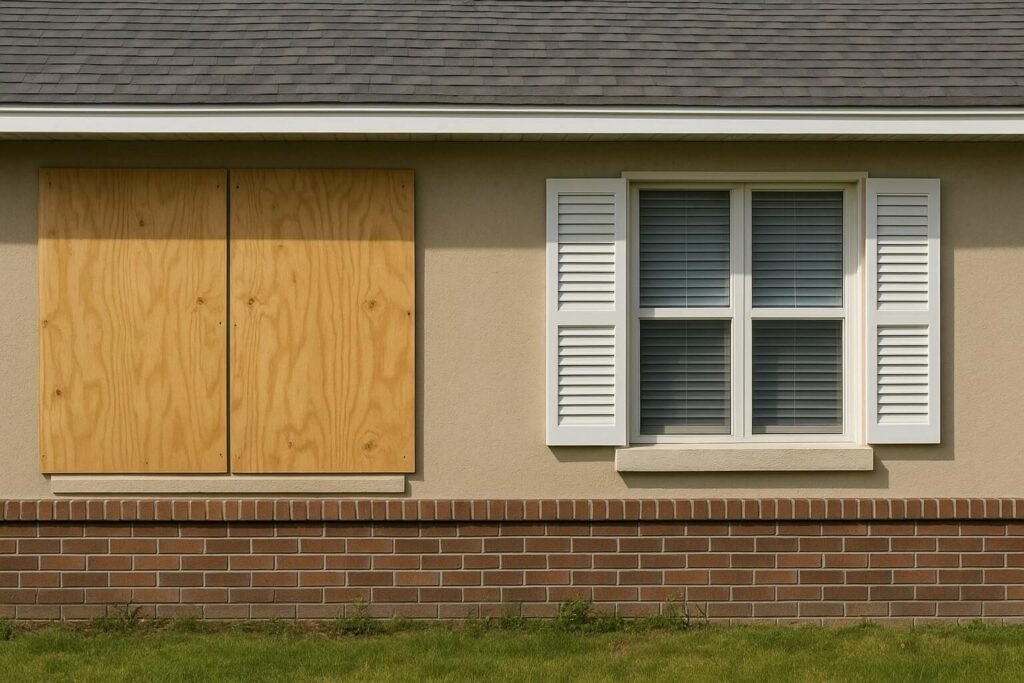When a cyclone’s path starts curving toward your coast, one question comes faster than the wind itself: should you board windows or install permanent shutters? It’s not just a matter of budget—it’s a decision that could make the difference between a soaked carpet and a torn-off roof.
Here’s a straightforward breakdown to help you choose the right protection, whether you’re facing your first cyclone or your fifth.
Why Boarding or Covering Your Windows Matters
A single broken window during a storm can turn your entire home into a wind tunnel. Once high-speed air gets inside, pressure builds fast. Roof tiles can lift. Doors may fly open. In the worst cases, entire sections of the house collapse from within.
That’s why experts like FEMA and NOAA consistently recommend: cover every window, glass door, and glazed opening before storm-force winds arrive.
The only real debate is how you do it—board windows with plywood, or install purpose-built storm shutters?
Option 1: Board Windows with Plywood
For many, boarding windows is the default option. It’s relatively cheap and easy to understand. But is it truly enough?
Materials and Costs
To board windows properly, you’ll need:
- Exterior-grade CDX or OSB plywood, at least 7/16 inch thick (⅝ inch is better).
- Pre-cut panels that overlap the window frame by 4 inches on all sides.
- Bolts or barrel-bolt mounting hardware secured into wall studs, not just siding.
If you already have tools at home, DIY costs hover around $2–4 per square foot. A single 3×4 ft window might run you about $70. Hiring help? Expect $5–10 per square foot—assuming you can find someone last-minute.
Performance and Durability
Thick, well-secured plywood panels can meet the same impact resistance tests as storm shutters—once. After that, moisture, UV damage, and repeated use will weaken them fast.
Also, consider the time it takes to board windows. It’s not a job you’ll want to start in 100 km/h winds. Each window can take 15–30 minutes to cover safely. That adds up, especially if you live alone or need to evacuate quickly.
Best Use Cases
- Temporary solution for renters or short-term stays.
- Budget-limited families prepping last-minute.
- Backup if shutters fail or can’t be deployed in time.
Option 2: Install Code-Rated Storm Shutters
Shutters cost more upfront, but offer long-term strength, speed, and security. Once installed, they’re part of your home—no ladders, drills, or splinters required when the next warning hits.
Styles and Costs
| Type | Deployment Time | Avg. Price (USD) |
|---|---|---|
| Metal/poly panels | 5 min/window | $5–30/sq ft |
| Fabric screens | 5 min | $10–25/sq ft |
| Accordion | 30–60 sec | $15–25/sq ft |
| Bahama / Colonial | 1–2 min | $20–50/sq ft |
| Manual roll-down | <30 sec | $20–50/sq ft |
| Motorized roll-down | <10 sec | $50–175/sq ft |
Once deployed, all options can protect against a 9-lb piece of timber launched at 50 feet per second—yes, that’s an actual code test.
Insurance Discounts
Most insurance providers in hurricane-prone zones offer 5–20% premium discounts for homes with rated shutters. Unfortunately, if you only board windows, you won’t qualify. Plywood is considered temporary and doesn’t meet code for long-term protection.
Long-Term Gains
- Faster deployment before a storm
- Qualifies for code and insurance rebates
- Increases resale value
- Safer for elderly or solo occupants
- No storage space needed
Side-by-Side Comparison
| Feature | Board Windows (Plywood) | Storm Shutters |
|---|---|---|
| Upfront Cost | Low | Higher |
| Time to Deploy | 15–30 min/window | Seconds to minutes |
| Reusability | 1–3 uses | 20+ years |
| Insurance Discount | None | 5–20% |
| Code Compliance | Limited | Fully code-rated |
| Aesthetics & Light | Must be removed | Can allow light/air |
| Storage Needed | Yes | No |
What the Building Codes Say
In places like Florida, new builds in windborne debris zones must come with impact windows or shutters. Boarding windows is allowed, but only if the panels meet specific thickness and fastener standards—and only for a limited time.
In the Indian Ocean, places like Mauritius are catching on too. New villas and resorts now fit powder-coated shutters as part of cyclone-resistant construction. Homeowners are realizing that boarding windows every season is not a long-term solution.
So… Should You Board Windows or Install Shutters?
Here’s the truth:
- If your budget is tight, board windows now—but do it right. Use thick plywood, pre-drill anchor holes, and store your panels properly.
- If you plan to stay long-term in a cyclone-prone area, invest in shutters. They’ll pay off in time saved, safety added, and insurance costs lowered.
If you’re somewhere in between? Start small. Protect your most vulnerable or hard-to-reach windows with permanent shutters, and board the rest. Build up your storm defenses over time.
Don’t Wait for the Wind to Decide
Cyclones don’t give you much notice. Whether you board windows or install shutters, the key is to act before the forecast turns urgent. Every window covered is one less entry point for destruction.
The next storm might not be your first—but with the right prep, it doesn’t have to be your worst.


